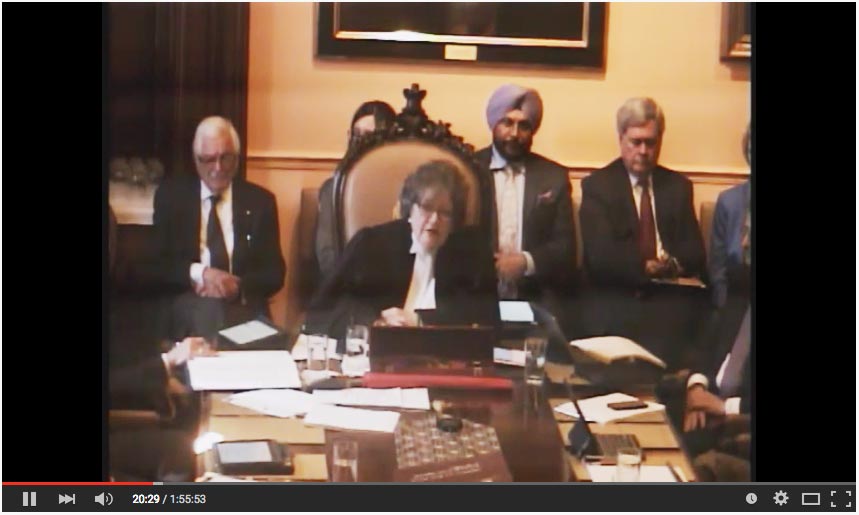Issues such as mental health and addictions, entity regulation, and standards for advertising were on the agenda, but what drew the most debate by far at the Law Society of Upper Canada’s June Convocation yesterday was a motion to continue webcasting the proceedings. The motion was eventually carried, after a debate that stretched deep into lunch hour.

The LSUC has been webcasting Convocation since the beginning of 2015, “to determine the level of the professions’ interest in Convocation, and to assess the ongoing value of providing an up-close look at the way Convocation operates as it considers its policy agenda,” according to a report presented to benchers by Bencher Peter Wardle.
However, Varro told Convocation, the LSUC has discovered, “perhaps a little to our chagrin” that its members do not seem as interested in proceedings as had been hoped, with “disappointingly small” numbers of people accessing the online webcasts — 27 in January, 17 in February, 27 in April, and 52 in May. This, he said, was despite e-mail notices and other communications. And the numbers, he noted, include LSUC staff.
At $1,600 per month plus tax, plus staff time and resources, webcasting Convocation will cost the LSUC an estimated $20,000 - $25,000 annually, said Varro.
Moreover, he noted, the existing webcasting system is not perfect. With just two cameras in the room, he said, there are limits on what viewers can see.
“Perhaps that’s just as well,” a bencher wisecracked from off screen, to a ripple of laughter.
After a meeting of Convocation’s priority planning committee earlier in June, Treasurer Janet Minor requested the question of continuing the webcasts be put to a vote. On Thursday, Varro presented benchers with a double motion: whether to continue webcasting, and, if not, whether to fully webcast only occasional Convocations at the Treasurer’s discretion, with other sessions available in audio only.
By the end of the ensuing debate,16 benchers weighed in. Most argued to continue the webcasts.
To those speaking in favour, the benefits of increasing Convocation transparency and accessibility outweighed the costs.
“People are already cynical about us,” opined Rocco Galati, at his first meeting since being elected. Before becoming a bencher, Galati said, he had considered Convocation a “closed shop.” Probably a not-uncommon perception among LSUC members, he suggested, but one that webcasting might help to reverse.
“The relevancy of this organization is declining severely,” agreed Raj Sharda, another new bencher. “It’s not apathy — unfortunately it’s a level of disrespect in the community.” The cost of food left over after LSUC meetings, Sharda said, likely amounted to more per year than the cost of webcasting Convocation.
“This is a no-brainer,” opined Julian Falconer in support of the webcasts. “This is what 2015 is all about.”
In addition to the webcasts, members of the public, including the media, can view Convocation proceedings via a TV connection in a small, windowless fourth-floor room in Osgoode Hall — a cramped, uninviting space, Falconer said.
“I defy folks to go to that room,” he said. “The surroundings don’t speak to openness.”
Michael Lerner said he was pleasantly surprised to learn the costs of webcasting, given the potential increase in transparency.
“I don’t think the issue is how many people tuned in,” he said. “It’s that people had the opportunity to tune in,” adding that the LSUC should take steps to increase viewership.
Janet Leiper said the LSUC should give the viewership of the webcasts more time to grow.
Others argued webcasting only those sessions likely to attract the greatest number of viewers would be a better option.
Christopher Bredt pointed out advantages of written transcripts (which the LSUC currently posts on its web site) over video or audio content. He highlighted the searchability of text, a huge boon, he said, to the time-pressed.
Update Jun 29: The secretary’s report dealing with the webcasting of Convocation was presented to Convocation by Bencher Peter Wardle, not Secretary Jim Varro, as first reported.

 The LSUC has been webcasting Convocation since the beginning of 2015, “to determine the level of the professions’ interest in Convocation, and to assess the ongoing value of providing an up-close look at the way Convocation operates as it considers its policy agenda,” according to a report presented to benchers by Bencher Peter Wardle.
The LSUC has been webcasting Convocation since the beginning of 2015, “to determine the level of the professions’ interest in Convocation, and to assess the ongoing value of providing an up-close look at the way Convocation operates as it considers its policy agenda,” according to a report presented to benchers by Bencher Peter Wardle.